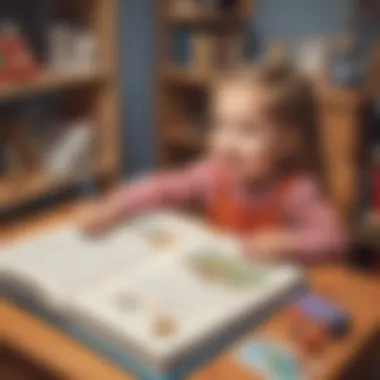Unlocking the Wonders of Rhyming Worksheets for Preschoolers to Foster Language Development


Interactive Learning Games
- The description of top educational games for preschoolers focuses on their ability to enhance children's vocabulary, phonemic awareness, and memory skills. By immersing children in rhyming activities through visually appealing games, educators and parents can effectively support language development from an early age.
- Playing educational games not only entertains children but also benefits their cognitive development. Rhyming games promote critical thinking, problem-solving, and connection between words, fostering a holistic approach to early childhood education. By incorporating these games into a child's routine, parents and educators can create a stimulating environment for learning and growth.
- Game reviews offer valuable insights into the effectiveness of selected educational games for preschoolers. In-depth evaluations focus on gameplay mechanics, educational content, and the overall impact on children's learning. Comparing different games in terms of engagement levels and learning outcomes helps caregivers choose the most suitable options to support children's cognitive development.
Educational Topics
- Rhyming worksheets for preschoolers align with the interdisciplinary learning approach that encompasses various subjects like language, vocabulary building, and cognitive skills. Integrating rhyming activities into educational topics enhances children's understanding of language structure and fosters creativity.
- The importance of interdisciplinary learning for holistic development underscores the synergy between different subjects in early childhood education. Rhyming worksheets not only teach children about words that sound alike but also stimulate their curiosity to explore different themes and concepts through language-related activities.
Tips and Tricks: Enhancing Rhyming Skills
- Parents and educators can enhance children's rhyming skills by incorporating practical tips into their daily routines. Strategies such as reading rhyming books with children, singing rhyming songs, and playing rhyming word games can strengthen their phonological awareness naturally.
- Making rhyming learning fun and engaging involves creating mnemonic devices, storytelling, and incorporating rhymes in everyday conversations. By associating rhyming words with familiar objects or experiences, children can grasp the concept more effectively and retain their knowledge.
Creative DIY Projects: Rhyme-Inspired Crafts
Step-by-Step Guides
- Engaging DIY projects that promote creativity allow children to express themselves artistically while enhancing their cognitive and motor skills. Step-by-step instructions for creating rhyme-inspired crafts provide a hands-on approach to learning, encouraging children to think creatively and develop fine motor abilities.
- The benefits of hands-on activities for children's cognitive and motor skills are evident in rhyme-themed DIY projects. By actively participating in crafting activities, children improve their coordination, concentration, and spatial awareness while expressing their artistic ideas through tangible creations.
Craft Ideas
- Creative craft ideas using simple household items offer children endless possibilities to explore their imagination through art. Incorporating rhyme-inspired elements into crafts not only reinforces rhyming concepts but also promotes artistic expression and individuality among young learners.
- The importance of artistic expression in children's development highlights the role of creative activities in enhancing emotional intelligence, problem-solving skills, and self-confidence. By encouraging children to engage in craft projects that involve rhyming elements, caregivers support their overall growth and creativity.
Introduction to Rhyming Worksheets
Rhyming is a fundamental aspect of language development in preschoolers, playing a crucial role in enhancing their cognitive abilities and literacy skills. In this article, we will delve into the significance of incorporating rhyming worksheets tailored specifically for young learners. By exploring different types of rhyming activities and exercises, parents, teachers, and caregivers can provide engaging tools to support early childhood education.
Importance of Rhyming in Early Childhood
Enhancing Phonemic Awareness


Enhancing phonemic awareness through rhyming activities helps children identify and manipulate sounds within words, laying a strong foundation for reading success. Phonemic awareness is a key predictor of reading achievement, making it essential for preschoolers to develop this skill early on. By engaging in rhyming exercises, children can sharpen their ability to distinguish and manipulate sounds, boosting their overall literacy skills.
Boosting Vocabulary Development
Rhyming activities also play a significant role in boosting vocabulary development among preschoolers. By exposing children to a variety of rhyming words, they expand their vocabulary in a fun and engaging way. Rhyming helps children make connections between words, understand word patterns, and enhance their language skills. Through vocabulary-building rhyming worksheets, children can enrich their word knowledge while enjoying the rhythmic nature of language.
Improving Reading Skills
Rhyming is closely linked to improving reading skills in young children. Recognizing rhyming patterns helps children decode words more easily, leading to improved reading fluency. As children engage in rhyming exercises, they become more attuned to word patterns and phonetic relationships, enhancing their overall reading comprehension. By regularly practicing rhyming activities, children can strengthen their reading skills and develop a deeper appreciation for language.
Benefits of Using Worksheets for Preschoolers
Enhanced Learning Engagement
Interactive rhyming worksheets enhance learning engagement by making language activities enjoyable and interactive. Children are more likely to participate actively when rhyming exercises are presented in a creative and stimulating manner. By incorporating visuals, games, and puzzles into rhyming worksheets, educators can capture children's interest and maintain their focus throughout the learning process.
Development of Critical Thinking
Rhyming worksheets encourage the development of critical thinking skills in preschoolers by challenging them to identify, analyze, and create rhymes. Critical thinking is essential for cognitive development and problem-solving abilities, making it a valuable skill to cultivate early in life. Through rhyming exercises that require logical reasoning and creative thinking, children enhance their cognitive flexibility and decision-making skills.
Promotion of Language Skills
Rhyming worksheets promote the development of language skills in preschoolers by emphasizing linguistic patterns, vocabulary expansion, and phonemic awareness. Language is a fundamental aspect of communication and cognitive development, and rhyming activities serve as a dynamic way to strengthen children's language abilities. By engaging in various rhyming exercises, children not only enhance their linguistic proficiency but also express their creativity through wordplay and rhyming challenges.
Overview of Kidlect Web Portal
Brief Description of Kidlect
Kidlect is a comprehensive online platform that offers a wide range of educational resources, including interactive rhyming worksheets for preschoolers. The platform features engaging activities and games designed to enhance children's literacy skills and language development. With Kidlect, parents, teachers, and caregivers can access high-quality rhyming materials to support early childhood education.


Detailed Description of Kidlect
Kidlect provides detailed and informative content on rhyming worksheets, ensuring that caregivers have access to a wealth of resources to promote language development in preschoolers. The platform offers interactive exercises, printable worksheets, and learning tools geared towards enhancing children's rhyming abilities. Through Kidlect's user-friendly interface, users can easily navigate through the diverse collection of rhyming materials to create tailored learning experiences for young learners.
Target Audience of Kidlect
Kidlect caters to a diverse audience of parents, educators, and caregivers who are invested in promoting early childhood education and language development. The platform's resources are designed to meet the needs of different user groups, ranging from parents seeking supplemental learning materials to teachers wanting to integrate rhyming activities into their curriculum. With a focus on inclusivity and accessibility, Kidlect aims to empower individuals involved in children's education to foster a love for language and literacy through engaging rhyming worksheets.
Exploring Rhyming Worksheets
Types of Rhyming Worksheets Available
Matching Rhyming Words
Matching Rhyming Words, a key component of rhyming worksheets, plays a crucial role in helping preschoolers grasp the concept of sound patterns and word associations. By identifying words that share similar ending sounds, children enhance their phonemic awareness and vocabulary development. The unique feature of Matching Rhyming Words lies in its ability to make learning engaging and enjoyable for young minds. While it fosters language skills, it also promotes critical thinking by encouraging children to discern similarities in words, making it a popular choice for educators seeking interactive resources.
Rhyming Word Puzzles
Rhyming Word Puzzles offer a dynamic approach to reinforcing rhyming skills in preschoolers. By presenting words in a puzzle format, children are challenged to connect words based on their rhyming patterns, thereby enhancing their ability to identify and create rhymes. The key characteristic of Rhyming Word Puzzles is their ability to stimulate critical thinking and problem-solving skills while reinforcing language development. Educators find this resource beneficial as it encourages active engagement and independent thinking among young learners.
Creating Rhyme Patterns
Creating Rhyme Patterns is a creative exercise that allows preschoolers to express their understanding of rhyming through pattern formation. By arranging words to form rhythmic patterns, children not only reinforce their knowledge of rhyming words but also enhance their creativity and artistic skills. The unique feature of Creating Rhyme Patterns lies in its ability to blend linguistic concepts with artistic expression, making it a versatile choice for educators looking to integrate art and language in a cohesive manner. While it fosters imagination and pattern recognition, it also cultivates an appreciation for the rhythmic aspects of language.
Interactive Rhyming Exercises
Rhyme Identification Activities
Rhyme Identification Activities are interactive exercises designed to help preschoolers recognize rhyming patterns within words. By engaging in activities that require them to identify words that rhyme, children refine their auditory discrimination skills and develop a sharper ear for phonetic similarities. The key characteristic of these activities is their hands-on approach to learning, which enhances sensory perception and cognitive development. Their unique feature lies in the immediate feedback they provide, enabling children to self-assess and correct their understanding of rhyming words.


Rhyming Word Fill-in-the-Blanks
Rhyming Word Fill-in-the-Blanks tasks preschoolers with completing sentences by filling in missing rhyming words, thereby consolidating their understanding of word patterns and associations. This activity fosters creativity and language mastery by challenging children to think critically about word endings and sounds. The key characteristic of Rhyming Word Fill-in-the-Blanks is its ability to promote vocabulary expansion and sentence construction skills. While it encourages active participation, it also reinforces the concept of rhyming in a playful and engaging manner.
Rhyme Time Bingo
Rhyme Time Bingo introduces an element of gamification to rhyming exercises, making learning a fun and social activity for preschoolers. By playing a traditional bingo game with a rhyming twist, children not only reinforce their rhyming skills but also enhance their social interaction and turn-taking abilities. The key characteristic of Rhyme Time Bingo is its ability to create a competitive yet cooperative learning environment, stimulating cognitive development and strategic thinking. Its unique feature lies in the blend of auditory, visual, and social elements, making it a holistic choice for educators seeking to enrich the learning experience.
Engaging Rhyme Games for Preschoolers
Rhyme Memory Match
Rhyme Memory Match is a memory-based game where children are tasked with identifying pairs of rhyming words by flipping cards. This game enhances memory retention and cognitive skills while reinforcing rhyming patterns in a playful context. The key characteristic of Rhyme Memory Match is its ability to challenge children's visual memory and auditory discrimination simultaneously, making it a multifaceted resource for cognitive development. Its unique feature lies in its adaptability for different skill levels, allowing educators to tailor the game to meet individual learning needs.
Rhyme Sorting
Rhyme Sorting prompts children to categorize words based on their rhyming patterns, fostering critical thinking and categorization skills. By organizing words into groups of rhymes, children deepen their understanding of phonetic relationships and word structures. The key characteristic of Rhyme Sorting is its capacity to encourage logical reasoning and linguistic analysis, nurturing analytical abilities in young learners. Its unique feature lies in its hands-on approach to learning, which stimulates tactile and visual senses while reinforcing conceptual understanding.
Rhyme Time Scavenger Hunt
Rhyme Time Scavenger Hunt transforms the concept of rhyming into an exciting adventure where children search for rhyming words in their environment. By integrating real-world exploration with linguistic exploration, this activity not only reinforces rhyming skills but also enhances observational and deductive reasoning abilities. The key characteristic of Rhyme Time Scavenger Hunt is its immersive and experiential approach to learning, engaging children in interactive rhyming challenges outside the classroom. Its unique feature lies in the opportunity it provides for hands-on learning and application of rhyming concepts in everyday contexts.
Implementing Rhyming Worksheets in Early Education
Strategies for Introducing Rhyming Concepts
Incorporating Rhymes into Daily Routine
Incorporating rhymes into the daily routine of preschoolers is a systematic way to immerse them in a world of language play. By integrating rhymes into activities such as morning greetings, snack time rhymes, or bedtime lullabies, children are exposed to rhythmic patterns and sound structures effortlessly. This consistent exposure not only helps in language development but also enhances memory retention and cognitive flexibility. The repetitive nature of rhymes aids in reinforcing vocabulary and phonemic awareness, making it a popular choice for educators and parents looking to make learning enjoyable and impactful.
Utilizing Rhyming Books and Songs
Utilizing rhyming books and songs is a valuable tool in introducing and reinforcing rhyming concepts among preschoolers. By choosing age-appropriate books and songs with catchy rhymes and rhythms, children are not only entertained but also educated. Rhyming books create a visual and auditory experience that aids in language retention and comprehension. Songs with rhyming lyrics engage children kinesthetically and enhance their ability to internalize rhyming patterns. The unique feature of using rhyming books and songs lies in their multi-sensory approach to learning, catering to different learning styles and maximizing the effectiveness of rhyming exercises.
Creating Rhyming Challenges
Creating rhyming challenges adds an element of fun and exploration to the learning process. By presenting children with rhyming puzzles, riddles, or games, educators can stimulate critical thinking and creativity. Rhyming challenges encourage children to actively seek and identify rhyming words, enhancing their analytical skills and cognitive development. The interactive nature of rhyming challenges fosters a sense of achievement and motivation in children, making learning engaging and memorable. While creating rhyming challenges requires thoughtful planning, the benefits of cultivating a love for language and problem-solving skills outweigh any potential challenges.















